A Deadly Escalation in the War on Drugs
In a dramatic and lethal escalation of Washington’s war on drugs, the United States Coast Guard has confirmed its forces killed two individuals aboard a suspected drug-smuggling vessel in the eastern Pacific Ocean. The incident, which also resulted in the seizure of a significant cocaine shipment, is more than a tactical victory; it represents a hardening of U.S. policy and a visible extension of President Donald Trump’s muscular, law-and-order campaign just months before the presidential election.
The Lethal Confrontation at Sea
The confrontation occurred when the crew of the U.S. Coast Guard Cutter Munro intercepted a self-propelled semi-submersible (SPSS)—a low-profile vessel commonly used by cartels to evade detection. According to a statement from the U.S. Southern Command, the Coast Guard team opened fire on the vessel in self-defence after its crew demonstrated “hostile intent.” The ensuing exchange left two of the suspected smugglers dead.
Trump’s Widening Counter-Narcotics Campaign
While such interdictions are not uncommon, the use of lethal force marks a significant development in a campaign that President Trump amplified earlier this year. In April, the Trump administration launched an enhanced counter-narcotics operation in the Western Hemisphere, deploying Navy destroyers, surveillance aircraft, and Special Forces teams to the Caribbean and eastern Pacific. The stated goal was to disrupt the flow of narcotics and choke off funding for what the White House described as “corrupt actors” like Venezuela’s Nicolás Maduro.
A Political Move Ahead of the Election?
Critics and geopolitical analysts view the operation through a distinctly political lens. For an administration facing criticism over its handling of the COVID-19 pandemic and a turbulent economy, the anti-drug campaign offers a powerful narrative. It projects an image of strength, decisiveness, and a President actively protecting American borders from external threats—a core theme of his 2016 victory and his 2020 re-election bid. This latest incident, with its definitive and deadly outcome, serves as potent visual evidence for that campaign narrative.
Global Concerns and Human Rights Questions
The move is not without its detractors. Foreign policy experts have warned that this aggressive military posture could increase instability in Central and South America, potentially leading to more violent confrontations. The militarization of what is essentially a law enforcement issue raises pertinent questions about the rules of engagement and operational philosophy. Furthermore, human rights organizations have raised alarms about the use of lethal force in operations where suspects have not been tried or convicted, pointing to the risk of extrajudicial killings on the high seas.
Conclusion: A Campaign Fought on the High Seas
Ultimately, the deaths in the Pacific are a stark reminder that President Trump’s campaign isn’t just being fought at rallies and on television screens. It is being waged with military hardware in international waters. As the election clock ticks down, this “war on drugs” is becoming an increasingly visible theatre for a President determined to showcase his credentials as a tough commander-in-chief. This single interception has now become a deadly footnote in one of the most contentious political campaigns in modern American history.




